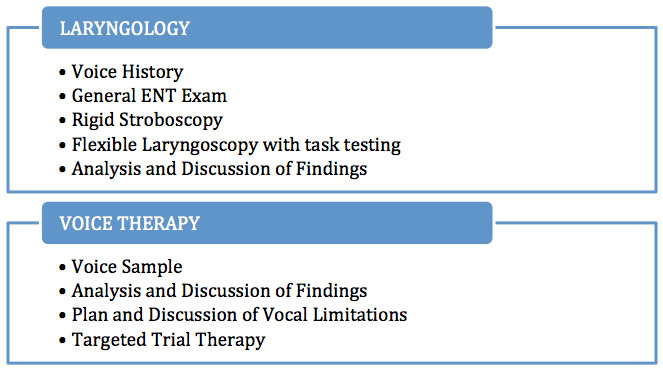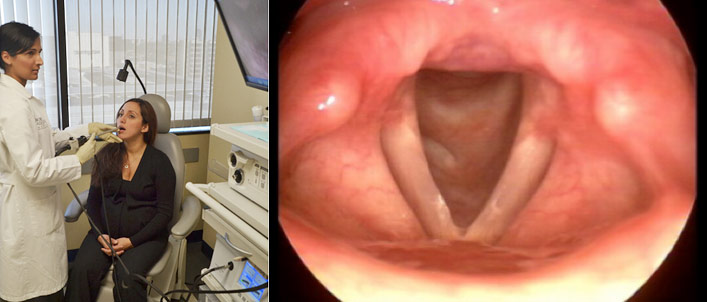- Question: How do the ingredients in e-cigarettes and vaporizers affect respiratory health? - August 16, 2019
- Bad Technique and Vocal Injury - January 9, 2019
- Is Edible Marijuana Dangerous for the Voice? Myths Dispelled - December 18, 2018
- Surprise! You have a hemorrhage - January 31, 2018
- Graves’ Disease: Treatment Overview - September 25, 2017
- Adele and the Stigma of Vocal Injury - July 11, 2017
- Vocal Curbside Consult: How does the thyroid affect the voice? - May 16, 2017
- Vocal Curbside Consult: How do hormones affect the voice? - May 3, 2017
- Vocal Curbside Consult: How do emotion and stress affect the voice? - April 17, 2017
- Vocal Curbside Consult: Vocal Recovery After Illness - April 7, 2017
What should I expect when I see a voice doctor?
Question: I am a professional singer and am very careful about my voice. I have gone to several doctors who are known as “voice doctors” for voice checks. However, somehow the experiences have been very different from each other. This has made me wonder if there is a standard I should expect from a voice doctor. As a performer, my voice is my life and I want the most comprehensive care available. What should a visit with a proper voice doctor consist of?
Discussion:
It is often very difficult for a voice user to find a qualified physician. This is because there are many physicians who call themselves “voice doctors” without the expertise and training to support this. This has resulted in patients having different experiences with each doctor, which produces uncertainty and a diminishing confidence in voice medicine. Voice professionals have had to rely on word of mouth or their own impressions to validate their physician. However, it is important to understand that a standard should exist. The harder the voice user pushes to demand this, the less likely that substandard evaluations will be performed.
A professional medical evaluation of the voice should be comprised of two main components, examination by a qualified laryngologist and analysis and treatment by a specialized voice therapist.

Figure 1: Quick reference to a comprehensive evaluation by a voice doctor.
Laryngologist Evaluation
Medical Professional: A proper and comprehensive examination of the voice user should begin with an evaluation from a physician who has subspecialized in the care of the voice, a laryngologist. These physicians have completed a medical residency program in otolaryngology (ENT) as well as subspecialty fellowship training in laryngology. These medical professionals are best suited to diagnose and treat the often misdiagnosed conditions of the larynx (voice box).

Voice History: The initial portion of the laryngology evaluation typically includes an interview. The voice history consists of questions intended to give the physician a background of the patients voice usage, limitations, previous injuries, training, concerns, and general vocal capacity. This information can help to pinpoint areas that need special attention.
General ENT Exam: The general ENT examination is performed to evaluate the health and function of the various structures of the head and neck. The health and optimal function of seemingly unrelated structures can, many times, contribute to proper vocal function and general well being.
Rigid Stroboscopy: A patient should always be evaluated with advanced imaging technology called stroboscopy. Stroboscopy is most commonly performed by gently inserting a telescope into the mouth. Sophisticated camera and lens technology allow the physician to visualize the vocal cords in high definition and in slow motion. Stroboscopy is the best way to evaluate vocal fold problems. It greatly decreases the incidence of misdiagnosis that occurs with older technology. Stroboscopy allows the laryngologist to clearly differentiate vocal pathology such as nodules, polyps, cysts, granulomas, hemorrhage, papillomas, or cancer.

Flexible Laryngoscopy: The final portion of the exam should include the use of a flexible camera that is passed through the nose, allowing the laryngologist to evaluate your voice for muscular issues. The physician will ask you to engage in complex vocal tasks as well as repetitive phonatory testing. In addition, if you are a singer, you may be asked to sing so that the physician may see your voice function during stress or during songs you are having difficulty with.
Voice Therapy
Medical Professional: Voice therapy is a critical component to effective vocal care. A voice therapist has completed training in speech and language pathology (SLP) as well as specialty training in voice therapy. These specialists work with patients to modify voice production, promote vocal fold healing, and correct harmful vocal habits. In addition, a vocal therapist can customize a treatment plan around a patient’s unique issues and capabilities.

Voice Sample: Speech and singing samples are recorded for the analysis of vocal technique. This is accomplished using studio quality equipment and industry standard software. Subtle vocal characteristics and potential issues that may not be readily apparent can be closely examined in this manner.
Analysis and Discussion of Findings: Voice samples allow the therapist to recognize and point out any compensatory or damaging techniques that the patient may be utilizing for voice production. Together with the patient, the voice therapist will go over the findings of the voice samples and how the results impact the health and function of the voice.
Plan and Discussion of Vocal Limitations: The voice therapist and laryngologist will collaborate in a multidisciplinary approach to compare findings. The findings of the voice samples and analysis will be compared to the results of the strobe and laryngoscopy imaging to determine the areas that can be changed and improved upon. This will help the voice therapist craft an appropriate and targeted therapy plan.
Targeted Trial Therapy: Voice therapy evaluation will result in targeted exercises and a treatment plan that has been customized for the patient. This treatment plan will address any pathology and optimize the voice to avoid future issues.



